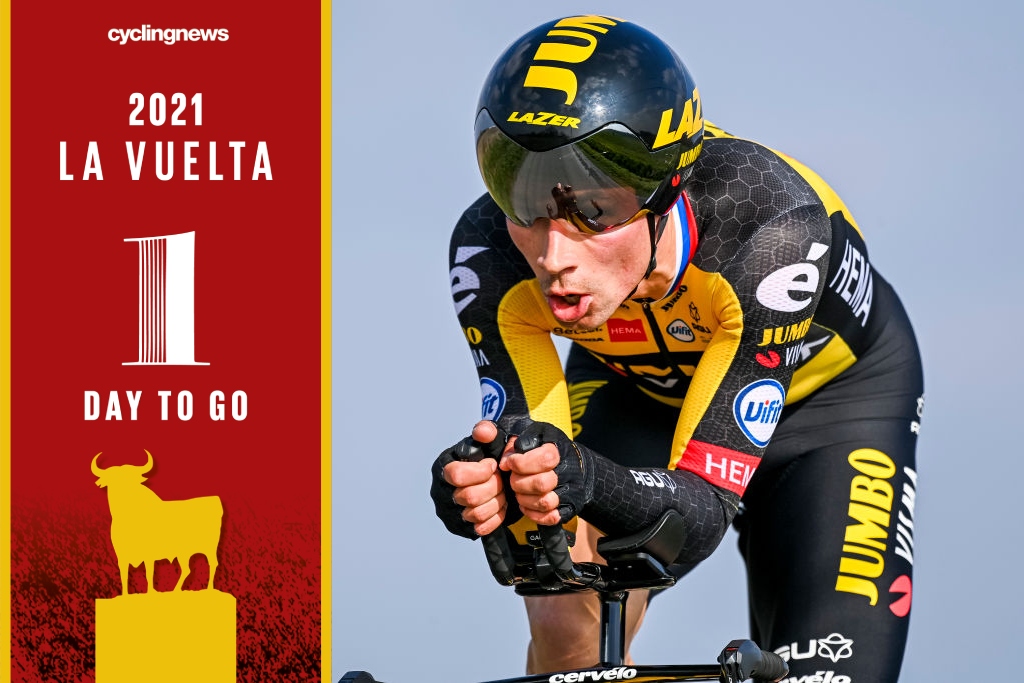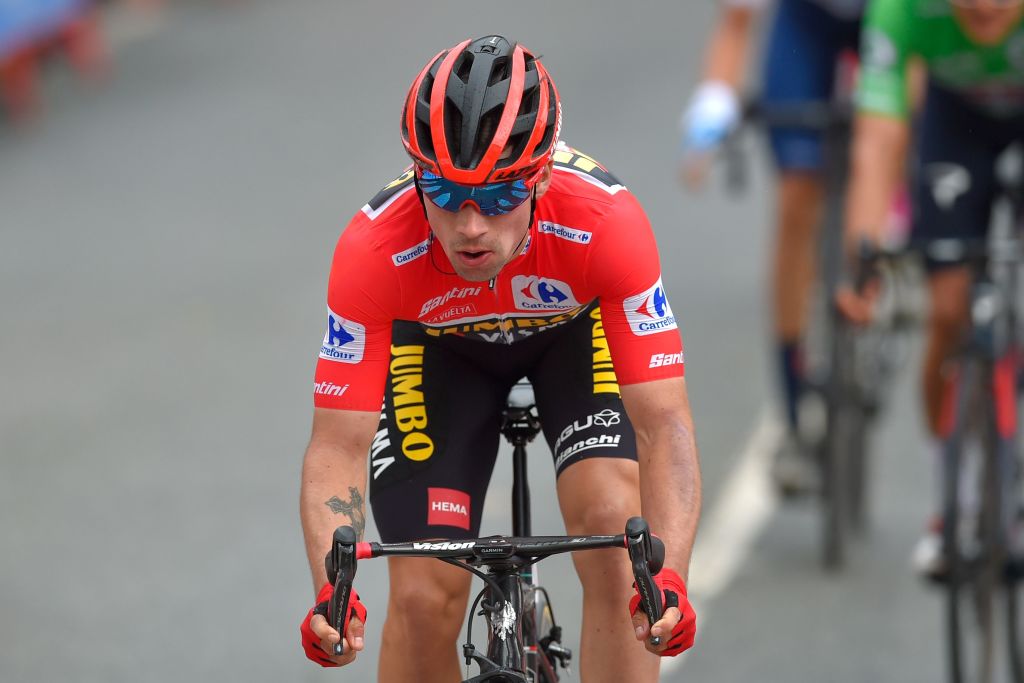Primoz Roglic seeking redemption via third Vuelta a España victory
Olympic time trial gold indicates Jumbo-Visma leader is ready to save his season after Tour de France crash

At three in the morning the day of the Olympic Time Trial, my phone went off, and by went off, I mean went off. Twenty five notifications in the span of a minute. Kate, wake up.
I managed to roll out of bed, drag myself into my office and turn on the GCN livestream, and there was Primož Roglič, all alone, a minute ahead of the others, his face the picture of poised determination.
As I watched this, watch him cross the finish line and keep going as though to make a further point, I was stunned. I myself had seen firsthand the carnage Roglič suffered during the third stage of the Tour. I stood there and watched him roll in, half his body raw from his short affair with the pavement, his face the picture of agony. For the few days after that, he struggled, labored tangibly.
Roglič’s Tour campaign was over. It was abundantly clear that it was over. And yet, during the time trial on stage five, he persevered, managing, despite being half mummified with bandages, to finish seventh.
It was the last day I would see him in good spirits, offering Jonas Vingegaard his blessing, a big smile on his face; the last day during that race where he was, as they say, a contender. A few days later, he would arrive in Le Grand-Bornand nearly the lanterne rouge. Roglič had burned his candle and soon he would go home. In Tignes, I stood outside the press hall and watched the race come in. Across the street, Roglič’s partner Lora Klinc, cheering on his teammates, notably without him.
To be honest, it was a waste. All that training, all that effort, all that experimentation with scheduling and race days (which very much could have done him in to begin with – too many days off the bike may have dulled the senses, but who knows for sure).
As for the crash on stage three, it was a simple accident. Roglič went into a space that wasn’t there and Colbrelli didn’t let him in. Whether one or the other was at fault is irrelevant at this point.
Get The Leadout Newsletter
The latest race content, interviews, features, reviews and expert buying guides, direct to your inbox!
Even then, on stage three of the Tour de France, there was talk of the Vuelta a España. When I asked Roglič’s press officer in passing whether he’d do the Vuelta before stage six, he said it was likely only if he abandoned the Tour. Well, in Tignes, he abandoned, but the official announcement wouldn’t come for a few weeks later.
It’s a familiar pattern for Roglič – fail in France and find redemption in Spain.
A particularly striking characteristic of the Slovenian compared to his contemporaries is that when Roglič loses, he really loses. His failures are catastrophic, explosive, and often, as we saw in the Tour last year, unexpected. Sometimes, he himself is to blame – admittedly, he’s not the best bike handler in the peloton – and sometimes, as in that fateful day in September on La Planche des Belles Filles, they’re not.
However, the Vuelta, with its reliable schedule of brutalizing climbs and time-trial heavy routes, seems to be his race, to the point where he’s becoming a bit of a specialist, the likes of which we haven’t seen in decades.
Even in this year, which is by far his most disappointing since the days before his ascendancy, Roglič still pocketed wins in Itzulia Basque Country and the Olympic time trial (both putting to bed any recency bias that he is is a middling or fading time trialist.) Still, if Roglič manages to pull off a win in Spain, it would be a massive feat, one that would right the wrongs of a year he would likely want to forget, glimmering moments of triumph be damned.

A good story
Sometimes people ask me why he’s so likeable despite his dominance and rather chilly and aloof disposition on television.
The answer is because he’s a good story and has always been. We all know that Roglič used to be a ski jumper to the point that it’s become a meme. However, that backstory is still relevant and important and sets up the pattern that defines Roglič’s life, the uneasy tension between success found and occasionally ripped away.
Roglič still loves talking about his days as a ski jumper, and the snow remains his first love despite his many years away from it. When I mentioned to him in an interview in February that I’d been snowed into my apartment in Chicago, he responded, wistfully, “Oh, I love the snow.”
He still skis cross country, in the winter. Roglič did everything he could to become a cyclist, and for him, cycling and finding victory within its long arduous rhythms is an exercise of existential fulfillment.
Other cyclists will talk about how much they love riding a bike, but Roglič never speaks in terms of love or passion – he speaks in terms of cycling “suiting him” as something he was made to do. A dream fulfilled. To watch him try and try again despite the extreme lows inspires us all, is a testament to the power of sport to motivate and drive us to better ourselves.
When he wins, it’s blissful. When he wins, it feels like we’re winning with him. But his wins wouldn’t feel as cathartic if he didn’t lose, if he weren’t as human as he is, as fallible, regardless of how effortless he looks on a 9 per cent climb with three kilometers left to go.
Can Roglič win the Vuelta? Of course he can – he has the track record to prove it.
The course, with its heavy time trial and mountain-heavy backload, fits a rider of his skillset. The Olympic time trial should put to rest any remaining questions of diminished form after his poor stint in the Tour. There’s no doubt that he’s motivated, no doubt that he’s confident, no doubt, really, that he’s prepared, despite the short notice.
He’s also got a strong team with riders proven to have helped him in the Vuelta previously, namely Lennard Hofstede, an instrumental domestique, and teammates who are coming off of their Tour form, including Sepp Kuss, who won the Andorra stage there.
The playing field is open enough where Roglič can shine through, even though he will have very stiff competition in Mikel Landa and Egan Bernal. Regardless if he wins, there’s every possibility that he’ll be able to claim stages at the very least. In a way, for an entire year, we’ve been waiting for Primož Roglič to arrive. Well, his time, after all the chaos of before, appears to have finally come, yet again at the Vuelta a Espana.
Kate Wagner is a Chicago-based writer and critic. Her work on cycling can be found in various publications including Procycling. Her newsletter covers cycling in an unconventional fashion, featuring essays, short stories, multimedia works and illustration.
She can be found Tweeting at @derailleurkate